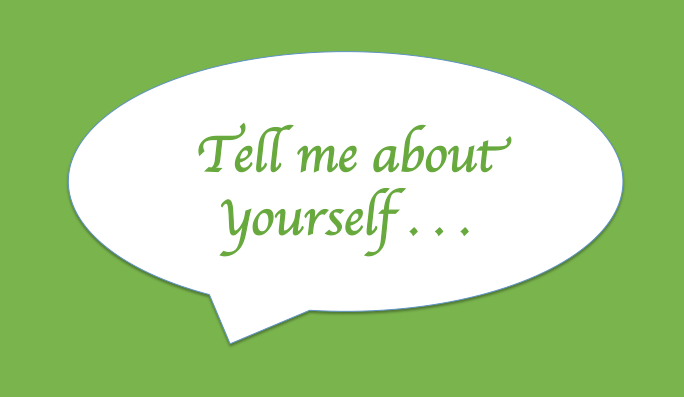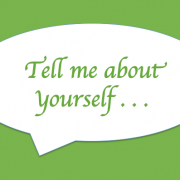How to answer “Tell me about yourself”

“Tell me about yourself” or “Walk me through your resume (or your CV)” is a very common question during a job interview. As you know it’s probably coming, expect for it, prepare for it, and answer it effectively. No need to get nervous.
This question is usually among the first ones in an interview. Because its purpose is to get to know you and put you at ease. It’s an ice-breaker. The interviewer has already read your CV, and now she wants to hear how you introduce yourself face to face, and understand why your are there.
This is also the time for you to frame the conversation with a few well-rehearsed sentences regarding how you want to be perceived – i.e. why you are the right person for the job – and make a good and impactful first impression right at the beginning.
How to answer?
How to effectively answer “Tell me about yourself”? Here are a few tips on how to address this open-ended question smoothly and effectively.
1. Provide an in-depth answer in 2-3 minutes
Answer succinctly. Be straight to the point. In fact, your interviewer is not requesting a literal retelling of your resume. And if you don’t cover everything, it’s better that the interviewer asks you follow questions, rather that she interrupts you and stops you in the middle of your answer.
2. Don’t mention everything you did
You don’t need to talk about your education since elementary school or about each and every job you had. Your response should summarize 3-5 key points that describe your education, relevant experience, why you are interested in the industry/company/position and how you fit into it. Make sure that you give enough information without getting lost in the details or providing irrelevant, non value-adding ones. And if the interviewer wants to know more, she’ll ask for it.
For example, if you apply for a marketing position at a pharmaceutical company, you may say something like “After my B. Sc in chemistry, I did an MBA. After 4 years of work in 2 organizations, I joined the consulting firm XX, where I had an extended assignment with a major pharma company. This made me realize the growth and potential of the industry, as well as how important is the role of marketing in making new drugs available to extend and improve life. I no longer want to look at all this as an outsider. I want to help physicians go beyond the treatments they learned in residency, and bring innovation in the practice. And my education in chemistry provides me a solid background to do this.”
3. Illustrate what you’ll add to the organization
You need to highlight your specific skills, expertise and accomplishments that fit the job. This means that you have to show with a tangible and compelling example how unique you are, and how your profile matches at least at 80% the requirements of the job.
For example, if you are a programmer you may say “I’m fast and methodical. Compared to my colleagues, I deliver high-quality codes with fewer defects, and faster. I enjoy collaborating with them, and – as I tend to be fast and accurate – when I can I volunteer to help them. This creates good morale. In addition, I’m an expert on XX which is key for the job in your company, and one does not learn it with a crush course“.
4. Demonstrate that you’ll be a good fit in the company culture
You may want to show that you fit the culture of the workplace. So, research the company’s core values and its principles. Read its mission statement or its “about” page, and identify what it cares about and how this overlaps with your career experience. And remember that the recruiter is looking for someone who shares the values that drive and sustain work and relationships in her organization.
For example, if it’s for a finance position in a company that values empowerment, consider something like “I am used and comfortable to take decisions in an autonomous way as most of my superiors were not micro-managers. Also, working with tight deadlines is normal for me, and this type of environment does not cause me stress or anxiety”.
5. Display confidence and be honest
Talking about yourself is normal and expected in an interview. You need to display confidence and talk about your achievements and successes. So, speak positively but don’t exaggerate. If you brag about yourself, you may create a bad impression and an adverse effect about your image.
If there are gaps or some flaws in your career history, say it. If there’s a gap because you have been taking care of your children or you took a sabbatical, highlight what you learnt during that period and which competencies you practiced. In case there’s a flaw, show that you are aware of it, and present it as an opportunity for improvement. And, if you have defined a development plan, mention it.
6. Speak clearly and make it natural
You don’t want to sound like a recorded message or someone who learnt his message by heart, and now just repeats it aloud. So, breathe and modulate your voice. In addition, speak in a clear tone, a bit slowly, and use pauses where appropriate. Try to be casual and sound authentic.
What better way to improve your way to answer than to practice?
You know that in 90% of interviews you’ll be asked to walk your interviewer through your resume. So – if really you care for that job and that interview – prepare for it. Be smart. Prepare your message, practice how to answer this question, get it ready and become proficient. And don’t forget the old (and always actual) way of saying “Practice, makes perfect!”
Check this out for tips for adjusting your pitch and make it sound like a casual conversation.



